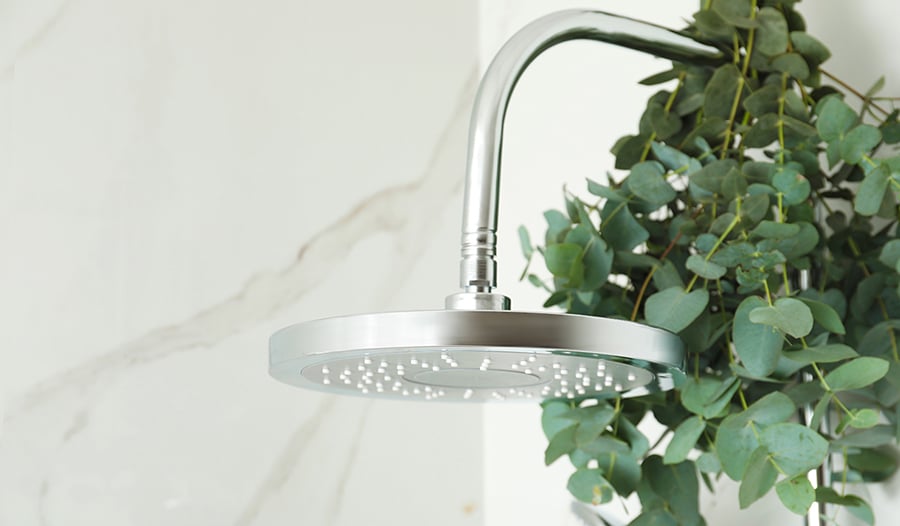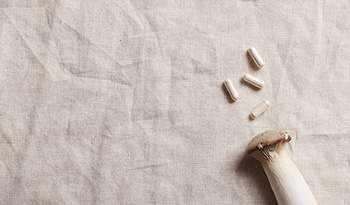在淋浴間懸掛桉屬植物的3大原因

桉樹油有什麼功用?
桉樹精油 歷史上用於治理肺部疾病,也因為它的抵禦細菌功效而被用於古老療法。桉樹油是利用蒸汽蒸餾方法從桉樹葉中提取出來的油。這種油與桉樹葉相似,具有濃烈、清新的獨特香味。桉樹精油可以從不同的桉樹品種提取,每種都具有不同的效果。
大多數桉樹油的主要成分是桉葉油醇(1,8-桉樹腦),水平從45-77%不等,甚至含量可能更高。桉樹精油通常用於草本軟膏,以治理胸部和鼻竇充血。正如許多民間療法,特新研究開始支持桉樹油的歷史用途。
桉樹油和呼吸系統疾病
提起 桉樹油,大多數人可能會聯想到吸入這種油來幫助緩解鼻竇和胸部充血。桉樹油的主要成分桉葉油醇具有溶解粘液特性。簡單來說,它有助於減少粘液。研究顯示,桉葉油醇可顯著降低參與粘液產生的兩種基因的表現。
除了粘液溶解作用,桉葉油醇還有助於鬆弛呼吸道的平滑肌。這可以幫助肺部擴張,減少充血,使呼吸更容易。除此之外,桉樹油還展示出強大的緩解炎癥活性,進一步彰顯它對呼吸系統疾病的益處。大多數關於桉樹油對呼吸益處的研究,都是使用口服膠囊形式的純桉葉油醇。
桉樹油的抵禦細菌作用
桉樹具有衆所周知的抵禦細菌作用,盡管在各桉樹物種之間也存有顯著差異。在某些情況下,桉樹油已被證明可有效殺死真菌、細菌和寄生蟲,並具有潛在的抗病毒作用。
真菌
與標準抗真菌藥品相比,桉樹精油對口腔中的念珠菌具有相似的作用。研究的作者基於有關結果而得出結論,指稀釋的桉樹油可能有助於保持口腔衛生。多年來,桉樹一直是幾種不同的 天然漱口水產品的常見成分。
細菌
由於細菌抑制劑的過度使用,細菌對標準抵禦細菌修復的機體防禦力越來越強。好幾種細菌以其耐藥性而聞名,包括金黃色葡萄球菌和結核分枝杆菌。特近的一項研究發現,桉樹精油對大多數抗藥性金黃葡萄球菌(MRSA)的菌株具有令人滿意的效果。其他研究也得出類似的結果。
全世界約有四分之一的人口感染了導致結核病的細菌。這些人中的一部分會患上結核病。這是一種可能致命的肺部感染。結核病是由分枝杆菌感染所引起,包括結核分枝杆菌。一項研究發現,桉樹精油是一種頗有前景的潛在治理方法,可在1%的稀釋度下,完全控制具有多重抗藥性的分枝杆菌的生長。
寄生蟲
棘球絛蟲是一種寄生於動物體內的絛蟲,可以感染人類。在一項對綿羊絛蟲幼蟲的研究中,1%濃度的桉樹溶液可在一分鍾內殺死100%的幼蟲,效果與標準藥品聚維酮碘和硝酸銀相似。
頭蝨是另一種在兒童中常見的寄生蟲感染。標準治理方法採用神經毒性殺蟲劑氯菊酯,盡管數據顯示桉樹油也可能是一種選項。蝨卵暴露於10%桉樹油5分鍾後被有效殺死。蝨卵暴露於氯菊酯10分鍾後,仍有95%的孵化率。 生姜 精油 也顯示出類似的結果。研究發現,當它們與桉樹聯合使用時效果更佳。
驅蟲劑
某些桉樹品種,尤其是檸檬桉樹,作爲 天然驅蟲劑時顯示出具有令人滿意的效果。檸檬桉樹精油具有明顯的檸檬味。即使環境保護局的有效驅蟲劑清單中,也包括檸檬桉油在內。與普通桉樹不同,檸檬桉樹富含一種名爲香茅醛的化合物。
一些研究專門針對具驅蟲劑功效的天然化合物 ,當中包括若乾常見的 精油成分,如檸檬烯、桉葉油醇、香葉醇、丁香酚和香茅醛。檸檬烯存在於柑橘類精油中,如 橙子、 檸檬和 青檸。桉葉油醇存在於桉樹油之中。香葉醇存在於玫瑰油、玫瑰草油和 香茅油之中。丁香酚主要來自 丁香精油。至於香茅醛則存在於檸檬桉和香茅精油之中。以精油組合作爲防止蟲子的自然方法似乎頗有功效。
桉樹油確實會吸引一些會蜇人的蘭花蜜蜂,盡管這些蘭花蜜蜂僅在南美洲和中美洲生長。不過,蘭花蜜蜂被認爲較一般蜜蜂安心,而且不會在中南美洲以外的地方出沒。
安心性
許多探索 桉樹精油 效果的研究,皆使用口服形式的純化桉葉油醇。精油含有高效的天然化學物質,但攙雜的情況在某些商業產品中並不鮮見。近期的估計顯示,多達80%的市售精油可能存有某種方式的攙雜。
必須在具有專業知識的醫學健康提供者的建議下,方可嘗試口服精油,以確保安心性和適當的劑量。對於藥學使用精油,以獨立的實驗室分析確認產品的純度也很重要。
要點
對 桉樹精油 及其成分進行的研究,顯示出其具有令人滿意的活性,有助於緩解呼吸系統疾病。桉樹似乎還對多種生物體有抵禦細菌作用(包括某些細菌、真菌和寄生蟲)和抗病毒作用。使用精油作爲驅蟲劑的配方也顯示出成效,特別是檸檬桉樹精油。
參考文獻:
- Aldoghaim FS, Flematti GR, Hammer KA. Antimicrobial Activity of Several Cineole-Rich Western Australian Eucalyptus Essential Oils. Microorganisms. 2018;6(4):122. Published 2018 Dec 3. doi:10.3390/microorganisms6040122
- Tyagi AK, Malik A. Antimicrobial Potential and Chemical Composition of Eucalyptus globulus Oil in Liquid and Vapour Phase Against Food Spoilage Organisms. Food Chem. 2011;126(1):228-235.
- Sudhoff H, Klenke C, Greiner JF, et al. 1,8-Cineol Reduces Mucus-Production in a Novel Human Ex Vivo Model of Late Rhinosinusitis. PLoS One. 2015;10(7):e0133040. Published 2015 Jul 24. doi:10.1371/journal.pone.0133040
- Nascimento NR, Refosco RM, Vasconcelos EC, et al. 1,8-Cineole induces relaxation in rat and guinea-pig airway smooth muscle. J Pharm Pharmacol. 2009;61(3):361-366. doi:10.1211/jpp/61.03.0011
- Juergens UR. Anti-inflammatory properties of the monoterpene 1.8-cineole: current evidence for co-medication in inflammatory airway diseases. Drug Res (Stuttg). 2014;64(12):638-646. doi:10.1055/s-0034-1372609
- Fischer J, Dethlefsen U. Efficacy of cineole in patients suffering from acute bronchitis: a placebo-controlled double-blind trial. Cough. 2013;9(1):25. Published 2013 Nov 21. doi:10.1186/1745-9974-9-25
- Tesche S, Metternich F, Sonnemann U, Engelke JC, Dethlefsen U. The value of herbal medicines in the treatment of acute non-purulent rhinosinusitis. Results of a double-blind, randomised, controlled trial. Eur Arch Otorhinolaryngol. 2008;265(11):1355-1359. doi:10.1007/s00405-008-0683-z
- Worth H, Schacher C, Dethlefsen U. Concomitant therapy with Cineole (Eucalyptole) reduces exacerbations in COPD: a placebo-controlled double-blind trial. Respir Res. 2009;10(1):69. Published 2009 Jul 22. doi:10.1186/1465-9921-10-69
- Koshak A, Wei L, Koshak E, et al. Nigella sativa Supplementation Improves Asthma Control and Biomarkers: A Randomized, Double-Blind, Placebo-Controlled Trial. Phytother Res. 2017;31(3):403-409. doi:10.1002/ptr.5761
- Gupta I, Gupta V, Parihar A, et al. Effects of Boswellia serrata gum resin in patients with bronchial asthma: results of a double-blind, placebo-controlled, 6-week clinical study. Eur J Med Res. 1998;3(11):511-514.
- Juergens UR, Dethlefsen U, Steinkamp G, Gillissen A, Repges R, Vetter H. Anti-inflammatory activity of 1.8-cineol (eucalyptol) in bronchial asthma: a double-blind placebo-controlled trial. Respir Med. 2003;97(3):250-256. doi:10.1053/rmed.2003.1432
- Worth H, Dethlefsen U. Patients with asthma benefit from concomitant therapy with cineole: a placebo-controlled, double-blind trial. J Asthma. 2012;49(8):849-853. doi:10.3109/02770903.2012.717657
- Noumi E, Snoussi M, Hajlaoui H, Trabelsi N, Ksouri R, Valentin E, Bakhrouf A.Chemical composition, antioxidant and antifungal potential of Melaleuca alternifolia (tea tree) and Eucalyptus globulus essential oils against oral Candida species. J Med Plant Res. 2011;5(17):4147-4156.
- Elaissi A, Rouis Z, Salem NA, et al. Chemical composition of 8 eucalyptus species' essential oils and the evaluation of their antibacterial, antifungal and antiviral activities. BMC Complement Altern Med. 2012;12:81. Published 2012 Jun 28. doi:10.1186/1472-6882-12-81
- Iseppi R, Mariani M, Condò C, Sabia C, Messi P. Essential Oils: A Natural Weapon against Antibiotic-Resistant Bacteria Responsible for Nosocomial Infections. Antibiotics (Basel). 2021;10(4):417. Published 2021 Apr 10. doi:10.3390/antibiotics10040417
- Tohidpour A, Sattari M, Omidbaigi R, Yadegar A, Nazemi J. Antibacterial effect of essential oils from two medicinal plants against Methicillin-resistant Staphylococcus aureus (MRSA). Phytomedicine. 2010;17(2):142-145. doi:10.1016/j.phymed.2009.05.007
- Merghni A, Noumi E, Hadded O, et al. Assessment of the antibiofilm and antiquorum sensing activities of Eucalyptus globulus essential oil and its main component 1,8-cineole against methicillin-resistant Staphylococcus aureus strains. Microb Pathog. 2018;118:74-80. doi:10.1016/j.micpath.2018.03.006
- El Omari K, Hamze M, Alwan S, Osman M, Jama C, Chihib NE. In-vitro evaluation of the antibacterial activity of the essential oils of Micromeria barbata, Eucalyptus globulus and Juniperus excelsa against strains of Mycobacterium tuberculosis (including MDR), Mycobacterium kansasii and Mycobacterium gordonae. J Infect Public Health. 2019;12(5):615-618. doi:10.1016/j.jiph.2019.01.058
- Schnitzler P, Schön K, Reichling J. Antiviral activity of Australian tea tree oil and eucalyptus oil against herpes simplex virus in cell culture. Pharmazie. 2001;56(4):343-347.
- Panikar S, Shoba G, Arun M, et al. Essential oils as an effective alternative for the treatment of COVID-19: Molecular interaction analysis of protease (Mpro) with pharmacokinetics and toxicological properties. J Infect Public Health. 2021;14(5):601-610. doi:10.1016/j.jiph.2020.12.037
- Moazeni M, Hosseini SV, Al-Qanbar MH, Alavi AM, Khazraei H. In vitro evaluation of the protoscolicidal effect of Eucalyptus globulus essential oil on protoscolices of hydatid cyst compared with hypertonic saline, povidone iodine and silver nitrate. J Visc Surg. 2019;156(4):291-295. doi:10.1016/j.jviscsurg.2019.01.002
- Soonwera M, Wongnet O, Sittichok S. Ovicidal effect of essential oils from Zingiberaceae plants and Eucalytus globulus on eggs of head lice, Pediculus humanus capitis De Geer. Phytomedicine. 2018;47:93-104. doi:10.1016/j.phymed.2018.04.050
- CDC. Avoid Bug Bites. Centers for Disease Control and Prevention. Update May 6, 2021. Accessed August 30, 2021. https://wwwnc.cdc.gov/travel/page/avoid-bug-bites#repellent
- da Silva MRM, Ricci-Júnior E. An approach to natural insect repellent formulations: from basic research to technological development. Acta Trop. 2020;212:105419. doi:10.1016/j.actatropica.2020.105419
- Satyal P, Setzer WN. Adulteration Analysis in Essential Oils. In: Malik S (eds) Essential Oil Research. Springer, Cham. 2009:261-273. https://doi.org/10.1007/978-3-030-16546-8_9
- Schiestl FP, Roubik DW. Odor compound detection in male euglossine bees. J Chem Ecol. 2003;29(1):253-257. doi:10.1023/a:1021932131526
免責聲明:本健康中心不提供診斷⋯

















































































 目錄
目錄















